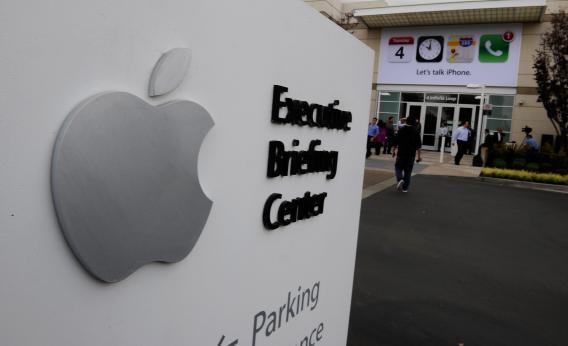I’m not in the business of dispensing investment advice, but the Financial Times’ Lex column runs the numbers on Apple’s weirdly cheap stock:
This performance will breathe new life into the tired old question of why Apple’s stock is so cheap. The stock rose to nearly $453 (up just 8 per cent) in after-hours trading following the announcement, leaving the shares trading at a laughable 10 times trailing earnings, once the $100 in net cash per share is backed out.
That’s to say that if you somehow managed to buy up everyone outstanding share of Apple overnight at its current price, then paid yourself a $97.6 billion dividend out of the company’s cash on hand, you’d now be in possession of a company with a trailing P/E ratio of 10. That’s the kind of valuation you expect from a profitable-but-stagnant company in a declining industry which seems like a poor description of Apple.
Pondering the situation helps us to understand some of the issues around “financial engineering” as a management strategy. On the one hand, it’s difficult to look at Apple and say that this is a poorly managed company with a straight face. They’re enjoying wild revenue growth and extraordinary profit margins. People love their products. They’re neck-in-neck with Exxon to have the largest market capitalization in America. In terms of the things that Apple’s managers are actually trying to accomplish, they’re clearly great at managing the enterprise. On the other hand, if you look at the market price of the shares in the company relative to any common sense view of the “real” value of Apple’s underlying assets (brand value, intellectual property, supply chain, workforce, etc.) they’re doing a terrible job. If you have a view of the firm where the managers have a fiduciary obligation to the firm’s owners to maximize the value of their investment, then Apple’s managers are clearly falling down on the job. Not because they’re bad at running a consumer electronics company, but because their financial engineering sucks. One possible response to this is to say so much the worse for the fiduciary theory of the firm. Waheed Hussain has a philosophically deep paper (PDF) making just that argument, and you could say that Apple is the empirical counterpart to that theoretical argument. If the fiduciary theory is correct, then Apple is in some ways one of the least-successful firms in America. But everyone knows that it is, in fact, one of the most successful firms so the theory must be wrong.
The conventional wisdom, however, is that the theory is correct so Lex continues:
That share price suggests investors think they will never see the cash. Apple must prove them wrong with a big dividend or buy-back, or both.
But then even Lex himself lacks the courage of his convictions on this point and after a bunch of discussion of the outlook for the company concludes:
It is hard to know what to think about the valuation. But it is easy to know what to do: buy the shares.
As I say, I’m not handing out stock market advice. But if we start with the idea that the shares are undervalued for lack of dividends and then lead to the conclusion that you should buy the shares even though nobody expects Apple to start paying dividends, then it would seem that management has won yet another battle. They evidently don’t want to spend their time massaging the share price, don’t see themselves as fiduciaries of the shareholders, and as long as they continue to succeed at the things they are trying to do they can keep the shareholder value chorus at bay. Whatever you do with your money, however, I think developing a more realistic account of how firms function and why should be on the agenda for economic research and business reporting alike.
